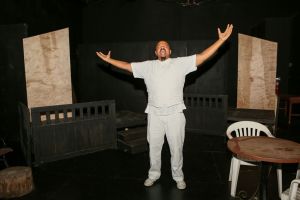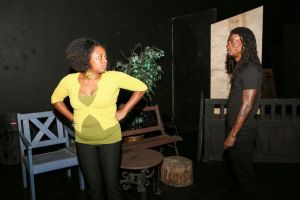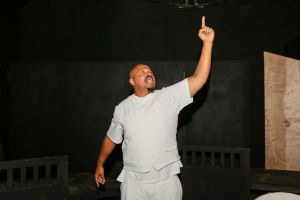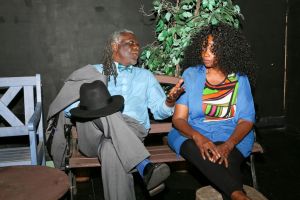Blood on the Mountain, IIIby Ayodele Nzinga, MFA, PhD |
Growing Family in the Land of Rocky Soil or Blood on the Mountian, IIby Ayodele Nzinga, MFA, PhD |
Tonya
does not want to have anymore children. Not in a world where "their
friends might kill them, the police might kill them, in a world that
don't respect life." She says her 17 year old daughter with a baby is
falling down a hole that it will take her a lifetime to dig her way out
of. As a part of her argument for an abortion she details the story of a
mother learning that her son has been shot down. She receives the news
as she is washing his clothes and preparing his dinner not knowing he
will never eat the meal or wear the laundry she has washed. It is
delivered as part of a chilling monologue that helps to explain why the
Lower Bottom Playaz offer a different brand of Wilson than you may have
come to expect.
We
play Wilson from the experience of our lives. We have lived beyond the
playwrights observations and see his descriptions of the now pass as
vivid depictions of our lived reality. The realty of drive-bys in the
eighties has given way to the police terror and continued inter-group
violence on steroids. We have seen the connection from the pass to the
present that Wilson intends and we see beyond it to an even more blasted
and blistered current moment.
Tonya's
monologue is a political position. She is in resistance to death with
her refusal to bear life. Her decision is also influenced by her man's
choices. His choices are influenced by his reality. But his answer is to
make something/life in the absence of all it takes to insure and
sustain that life. He insist they try even if they have to call the
undertaker.
She
has a baby daddy in jail and fears her current man who has done time
for murder is on a path back to jail. He, King Hedley, II is trying to
make life grow in the rocky soil he has inherited. He never considers
remaking the box his life came in --he is bound by his perception of
personal history, national history, blood, and honor and out of that
lens of those contexts and grim necessity he is using what he has been
given to create what he perceives he needs. His ability to do so is
impacted by other men who have their own rocky soil. It seems everyone's
garden in the land of rocky soil is watered by blood. Tonya's babies
father's have blood on their hands as she fears, instructed by her lived
experience, the possibility of her unborn child being bled of life.
King
wants the baby in order to put something in the world. He plants a seed
in the less than optimal soil of his backyard and sees it struggle to
grow and reasons a child deserves a chance at life, he advised Tonya
against putting it in a coffin before it draws breath. He wants to plant
a seed in life even if the soil is not all it could be. How else can we
go forward? How else can we get to the top of the mountain?
King
Hedley, II is a tale about men and blood honor. It is a tale of women
and longing for a life with good soil where love family and dreams can
grow. It is a saga about struggle, the weight of things older than us,
resistance and the prayer for redemption.
See it at the Flight Deck now through September 6, 2015.
Notes on Blood as a motif in King Hedley II
Blood
is a motif in King Hedley, II. It is a strong and instructive note. It
signals the life and death struggle to create and maintain life in
marginalized spaces. The tension between the discussion of abortions and
blood feuds destined to end in blood carry us through this speeding
train ride that can only end in a tremendous wreck. What else can happen
when the doors are all barred and life is on the other side.
King's
desire to sit on top of the mountain -- with the key given the
righteous requires -- he wipe the blood off his hands. He is told the
key is forgiveness but he is bound by codes of honor which dictate his
actions. Blood for blood is a mantra carried by his reflection in the
character of Mister. Mister outlines the tenets of honor and explains
that blood spilled requires the spilling of blood, especially in the
defense of your blood. It is a matter of honor. If a man kills your
blood you ain't supposed to be looking at him long. Someone must
die. Blood is energy, it is life, your bloodline is your most intimate
legacy, you are required to defend it.
What
pathology is engendered at the event of the interruption of a man's
ability to care for his blood. How then does one proceed with honor in
the world? At what point is crossing the line to ensure your blood
survives permissible? What would you do to insure your unborn child's
right to live in a world big enough to dream in? At what point does the
world get so small that the thought of new life, rather than inspiring
joy, births fear and desperation along with the consideration of
killing it before it breathes? Who turned the world around like that and
how do we find a way to thrive in a world where the path to life is
blocked by barbed wire or something even harder to cut through?
One
of Wilson's greatest skill displays in the work of The American Century
Cycle, is to show you the world-changing as the North American stands
in the same place, or even more disturbing as the ground beneath him
literally shrinks. The lack of work and the great difficulty
encountered by those who dream of thriving in a country they helped to
build with blood and sweat. Blood on the ground but no way into the
dream. King remarks that he was once worth $1200.00 during slavery but
in 1985 he is reduced to $3.35 an hour he says he is going backwards.
Mister observes the woman with the store got a bigger store and bigger
house to go with it, he speculates, if she could drive she would have a
bigger car. As the country moves forward North American African's have
moved further from center.
In
our current moment the ruthless gentrification of formerly affordable
communities and the continued economic inequity experienced by large
numbers of North American Africans coupled with a cannibalistic
educational system/carceral system and an escalation of inter-group
violence informed and encouraged by systemic violence perpetrated
against them magnifies the moment in which our characters live. We know
this dark moment goes on, gets deeper, becomes as consuming as an ocean.
King
Hedley like many young men today carries a gun because he fears
violence being enacted upon him. He has killed one man and is looking
to kill the man's kin to stop him from retaliating against him. He is
also about to become a father for the first time. While the sooth sayer
calls on him to wash the blood from his hands I wonder how he might go
about that. Some of the blood on his path is older than him. The sooth
sayer says he can right the house of his father even though it may be
torn asunder, but even the sooth sayer calls for the remission of blood.
Blood is the new life coming extending King's blood line and ultimately
his possibles in life. The question of honor may require him to shed
blood in order to live long enough to help sustain this new life.
Come and see who survives and what the blood cost of honor is. See King Hedley, II now through September 6.




 o
o

No comments:
Post a Comment